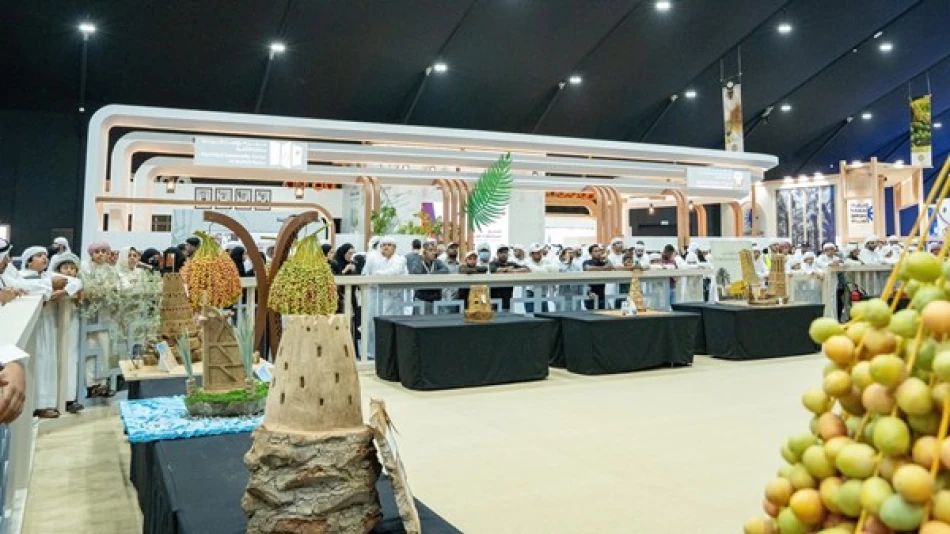
Lively Liwa Date Festival Attracts Over 50,000 Visitors in 5 Days
UAE's Liwa Date Festival Draws 50,000 Visitors as Emirates Reinforces Agricultural Heritage Strategy
The 21st edition of the Liwa Date Festival has attracted over 50,000 visitors in just five days, signaling the UAE's continued commitment to preserving its agricultural traditions while bolstering food security initiatives. Running until July 27 under the patronage of Sheikh Mansour bin Zayed Al Nahyan, the festival represents more than cultural celebration—it's a strategic investment in sustainable agriculture and heritage tourism that other Gulf nations are closely watching.
A Festival That Transcends Tourism
Organized by the Abu Dhabi Heritage Authority in Liwa city within the Al Dhafra region, this annual gathering has evolved into one of the Emirates' most significant platforms celebrating palm cultivation and authentic agriculture. The festival's impressive visitor numbers reflect growing regional interest in agritourism and cultural preservation, trends that align with the UAE's broader economic diversification goals.
The event's scope is remarkable: 24 competitions spanning date varieties, fruits, and model farms, backed by 308 prizes worth 8.735 million dirhams ($2.38 million). This substantial investment demonstrates Abu Dhabi's recognition that agricultural heritage can drive both cultural continuity and economic returns.
Strategic Competition Categories Signal Market Priorities
Premium Date Varieties Take Center Stage
The festival's 12 date competitions focus on premium varieties including Dabbas, Khalas, Fard, and Kheneizi—names that represent significant commercial value in regional and international markets. These aren't merely traditional contests; they're quality benchmarks that help UAE producers compete with major date exporters like Iran and Saudi Arabia.
The inclusion of specialized categories for Al Dhafra and Liwa elite dates, plus separate competitions for Al Ain varieties, reflects the UAE's sophisticated understanding of terroir—the environmental factors that give agricultural products distinct characteristics. This approach mirrors wine regions in France or coffee appellations in Colombia, suggesting the Emirates is positioning itself for premium agricultural branding.
Beyond Dates: Diversification in Action
Seven fruit competitions covering mangoes, figs, and lemons indicate the UAE's agricultural diversification strategy. As climate change threatens traditional farming worldwide, the Emirates is demonstrating that desert agriculture can produce variety, not just volume. The "home fruit basket" category particularly emphasizes local production capabilities, crucial for food security in a region heavily dependent on imports.
Educational Investment Yields Long-term Returns
Perhaps most significantly, the festival incorporates comprehensive educational programming through seminars, workshops, and lectures covering modern palm care techniques, pest management, and water recycling. This knowledge transfer represents genuine capacity building—essential for maintaining agricultural productivity as climate pressures intensify.
The children's learning area, which introduces young visitors to date varieties and palm care through interactive play, suggests long-term thinking. Unlike purely commercial agricultural fairs, Liwa is cultivating the next generation of agricultural stewards.
Regional Implications and Competitive Context
The festival's success occurs against a backdrop of intensifying Gulf competition for agricultural innovation and heritage tourism. Saudi Arabia's NEOM project includes advanced agricultural zones, while Qatar has invested heavily in controlled-environment farming. The UAE's approach—combining traditional knowledge with modern techniques while creating tourist attractions—offers a potentially more sustainable model.
The strong participation from across the UAE and GCC countries indicates regional recognition of the Emirates' agricultural expertise. This soft power projection through cultural events represents sophisticated diplomacy, particularly valuable as Gulf nations navigate post-oil economic transitions.
Market Implications for Stakeholders
For investors, the festival's robust attendance and substantial prize funding signal government commitment to agricultural sector development. The emphasis on quality competitions and educational programming suggests opportunities in agricultural technology, processing equipment, and specialized farming services.
Tourism operators should note the festival's family-friendly programming and heritage market components, which create replicable models for agritourism development. The integration of traditional crafts demonstrations with modern agricultural showcases offers templates for authentic cultural experiences that international visitors increasingly seek.
The festival ultimately demonstrates that heritage preservation and economic development need not conflict. By celebrating traditional agriculture while embracing innovation, the UAE is creating a model that other nations with rich agricultural traditions—from Morocco to Malaysia—might profitably study and adapt.
Most Viewed News

 Layla Al Mansoori
Layla Al Mansoori






